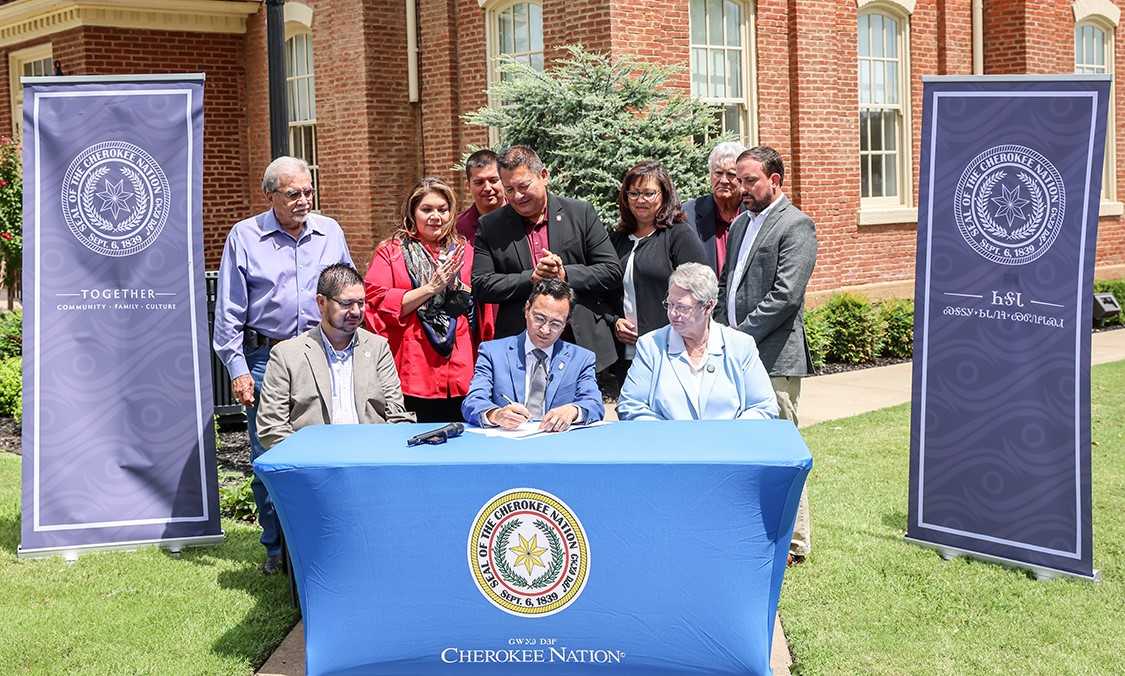
- Details
- By Chuck Hoskin Jr
Guest Opinion. As Cherokees, valuing family is core to our identity as a people. That value extends to our role as an employer, both for the Cherokee Nation government and Cherokee Nation Businesses. As our workforce has grown and evolved, we needed a better family leave policy to support workers in meeting both their work and home life obligations.
In collaboration with Deputy Chief Bryan Warner and the Council of the Cherokee Nation, we recently launched a new family leave policy that provides paid time off to all full-time employees with Cherokee Nation and CNB for the birth of a child or an adoption through the tribe’s Indian Child Welfare Department.
Cherokee Nation had long provided eight weeks paid leave for new mothers. The enhanced Cherokee Nation Family Leave Policy now also allows up to two weeks of paid leave for other parents who aren’t eligible for maternity leave, payable at 100% of their salary. The policy also doubles paid foster parent leave from five days to ten.
The benefits of offering paid leave for families are well-established. We know it’s crucial to provide both mothers and fathers with paid time off as they experience the blessings of a child. When men take parental leave, it has a long-term, positive impact, as they tend to take a greater share in the upbringing of their children. Our new policy also recognizes and supports the many wonderful ways our employees’ families can be structured, including fostering and adopting.
Under the prior policy, some of our employee fathers were able to take up to six weeks of their own accrued leave after the birth of their children, depending on a number of related factors. This update makes that leave more fair and universal to honor our employees and their families.
Offering this leave is a way to support strong families, and it is also an investment in the sustainability of our tribe and our businesses. We know that attracting and keeping great employees for the long-term, we must build trust with them. By honoring their needs for a strong and healthy home life, we know they will become even more capable in their work life too. No worker should ever have to choose between caring for their family and keeping their jobs.

The first days of a newborn’s life are a precious, irreplaceable time that should be spent with both parents whenever possible. Likewise, the first days of a fostered or adopted child adjusting to a new home should be spent with the support of all caregivers. With that strong start, Cherokee families can build a foundation of love and joy with each other.
Expanding parental leave is just the latest move we have implemented to support our workforce. We are on a steady path to a $15 per hour minimum wage by 2025, moving to $12 per hour in just a few months. We have engaged an outside expert to study all of our compensation, with additional focus on eliminating any gender disparity in pay. We implemented two hours of monthly “wellness leave” and are expanding walking trails and other such amenities at or near our work sites. All of this is a result of something Deputy Chief Warner and I are committed to: listening to our employees. All of it ultimately benefits thousands of Cherokee families.
I hope we can do better all over this country when it comes to building strong families, and I couldn’t be more proud of Cherokee Nation and CNB for leading by example. As a father and a grandfather, this is near and dear to me. As the employer of choice in northeast Oklahoma, this will go a long way in showing just how much we care about our workforce and their families.
Chuck Hoskin, Jr. is the principal chief of the Cherokee Nation.
More Stories Like This
Extending the Affordable Care Act Is a Moral Imperative for Indian CountryAll Is Fair in … War?
Why Federal Health Insurance Policy Matters to Cherokee Nation
The Absence of October's Job Report Shows Why Native American Communities Need Better Data
Tribal IDs Are Federally Recognized. ICE Agents Are Ignoring Them.
Help us defend tribal sovereignty.
At Native News Online, our mission is rooted in telling the stories that strengthen sovereignty and uplift Indigenous voices — not just at year’s end, but every single day.
Because of your generosity last year, we were able to keep our reporters on the ground in tribal communities, at national gatherings and in the halls of Congress — covering the issues that matter most to Indian Country: sovereignty, culture, education, health and economic opportunity.
That support sustained us through a tough year in 2025. Now, as we look to the year ahead, we need your help right now to ensure warrior journalism remains strong — reporting that defends tribal sovereignty, amplifies Native truth, and holds power accountable.
 The stakes couldn't be higher. Your support keeps Native voices heard, Native stories told and Native sovereignty defended.
The stakes couldn't be higher. Your support keeps Native voices heard, Native stories told and Native sovereignty defended.
Stand with Warrior Journalism today.
Levi Rickert (Potawatomi), Editor & Publisher

